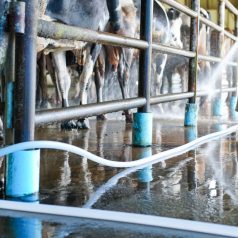
Our Invisible Neighbors
The Coop hosted a public talk last month by Dr. Teresa Mares, an anthropology professor at the University of Vermont. Dr. Mares gave a presentation on farmworkers and food justice in Vermont.
In her 2019 book, Life on the Other Border: Farmworkers and Food Justice in Vermont, Dr. Mares explores the personal vulnerability and food insecurity experienced by migrant farmworkers in our state, and analyzes the inequities, fear, and invisibility experienced by those who sustain our dairy industry. She speaks to these farmworkers’ humanity and resilience; their efforts to remain connected to the foods and customs that link them to their homes and families of origin.
While most of us take our ability to move freely about the state to shop for food for granted, nearly 95% of the migrant farmworker population in Vermont lacks personal transportation, despite the passage of legislation that allows state residents to obtain driving licenses regardless of citizenship status. Access to grocery stores (and healthcare) typically depends on the assistance and support of the farmers who rely on this workforce; or on volunteers. This disenfranchised and vulnerable population is uniquely challenged to access these basic necessities.
It is difficult for most of us to relate to these challenges and as a Coop Board, we want to understand our place as buyers and sellers of Dairy products produced in Vermont. In addition, there is a well-founded fear among migrant farmworkers that visiting a local grocery store, farmers market, or food shelf could result in detention or deportation. There is a reluctance to speak Spanish in these public spaces, and efforts are made to call as little attention to oneself as possible.
An estimated 1000-1200 farmworkers reside in Vermont, and it is calculated that nearly 70% of Vermont’s milk originates from dairy farms that rely on the work of migrants. Although these workers pay taxes and contribute to Vermont’s economic wellbeing and food security, there is an illogical disconnect between these farmworkers and their own access to food. Work schedules can approach 70 hours a week, thus there is little time in the day to prepare and eat wholesome meals.
Dr. Mares’ presentation highlighted the following topics:
- The reality and life experience of migrant workers and their families who sustain Vermont’s dairy industry include a deep connection to family, both local and beyond, along with considerable knowledge about agriculture. These are resilient individuals with a strong work ethic and a desire to be self-reliant, despite the challenges of limited access, choice, and opportunity.
- Vermont is a border state and, as such, migrant dairy workers face many of the same dangers as migrants at our southern border. The reach of Immigration and Customs Enforcement (ICE) extends up to 100 miles from the Canadian border, thereby presenting very real obstacles to food security, a healthy diet, and the overall well-being of workers and their families.
- Huertas means “kitchen gardens” in Spanish and the Huertas Project is a collaboration with volunteers and undocumented farmworkers that promotes growing and preparing food that has cultural relevance and helps diminish food insecurity. Participation in this project, which has largely been in Franklin County, has allowed workers to demonstrate their agricultural knowledge and skills, though gardens are often situated to reduce visibility from the road and therefore attract little attention. Efforts to expand this project to Addison County are important.
Dr. Mares’ presentation concluded with a multitude of questions from the engaged group. Speaking for myself, this was a beginning step in education about the unseen group of hard-working people who underpin our dairy industry. Next steps would include:
- Learning more about how our agricultural system and immigration policies are misaligned and how this has an impact on our overall food system in the United States.
- Exploring opportunities to become involved in actions that promote greater interaction with these invisible members of our community, and promote diversity, equity, and inclusion of these neighbors.
- Investigating affiliation with existing local groups that have established trusted connections with migrant dairy workers and engaging in activities that would alleviate food insecurity and promote access to foods that meet the cultural preferences of Latinx workers and their families.
For more information about this topic, please see an earlier post on our blog:
Louise Vojtisek is a Middlebury Co-op Board Member

